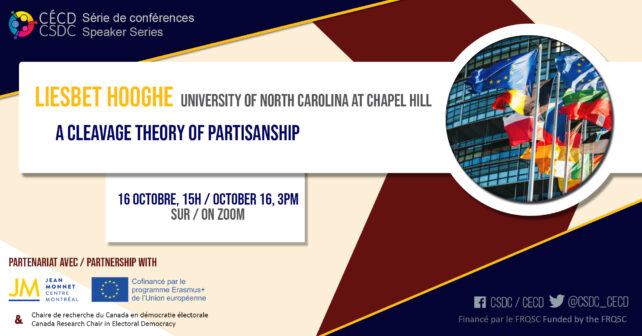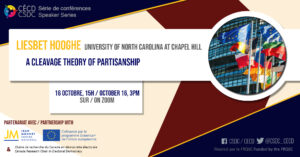

The Centre for the Study of Democratic Citizenship, in collaboration with the Centre Jean Monnet Montréal and the Canada Research Chair in Electoral Democracy:
Liesbet Hooghe (university of North Carolina at Chapter Hill)
A Cleavage Theory of Partisanship
You can learn more about Professor Hooghe by clicking here.
Where and When: Friday, October 16, 2020 at 3:00pm on Zoom.
Video of the presentation available here: https://www.youtube.com/watch?v=9Iy_biTXvA0
Important: We inform you that our events are recorded and posted on our website and our social media. For the first part of the event, only the speaker and the CSDC membre presenting the speaker are recorded. For the questions period, all the participants might be visible on the recording. If you do not want to be recorded, you can 1) turn out your camera and use the audio only to ask a question, or 2) ask your question in the chat, and the moderator will ask the question for you.
Abstract: The rise of a new transnational divide raises fundamental questions about the character of party competition and the causal bases of voting in Europe. We propose a non-parametric measure of the social bases of political parties which allows systematic comparison of behavioral and structural sources of change in composition. We illustrate the utility of the measure in cross-sectional and longitudinal comparison of European parties since 1975 by combining estimates from the Eurobarometer, the European Election Survey, and the European Social Survey in thirty countries. The measure reveals major shifts in the social composition of political parties and party families over the past five decades, and we demonstrate that on the new cleavage green and TAN parties have the most structured partisan preferences.
See all the other Speaker Series Events here.
This series is sponsored by the Centre for the Study of Democratic Citizenship, which is funded by the Fonds de recherche du Québec – Société et culture (FRQSC).

